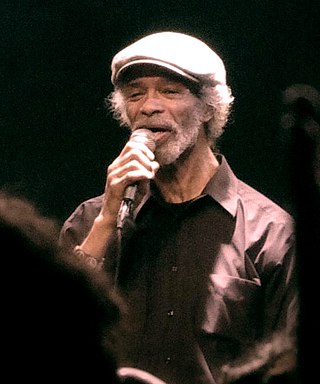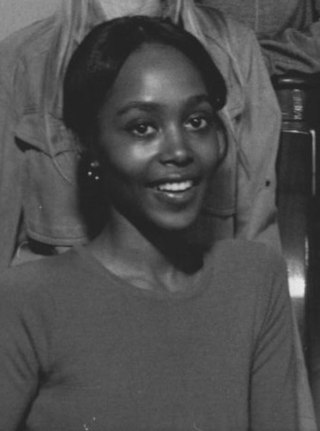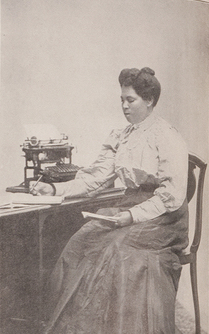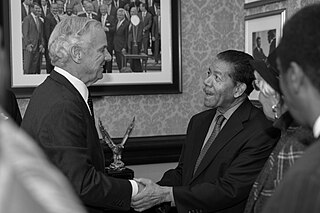Related Research Articles

Victoria Claflin Woodhull, later Victoria Woodhull Martin, was an American leader of the women's suffrage movement who ran for president of the United States in the 1872 election. While many historians and authors agree that Woodhull was the first woman to run for the presidency, some disagree with classifying it as a true candidacy because she was younger than the constitutionally mandated age of 35.

Orangeburg, also known as The Garden City, is the principal city in and the county seat of Orangeburg County, South Carolina, United States. The population of the city was 13,964 according to the 2020 census. The city is located 37 miles southeast of Columbia, on the north fork of the Edisto River.

Gilbert Scott-Heron was an American jazz poet, singer, musician, and author known for his work as a spoken-word performer in the 1970s and 1980s. His collaborative efforts with musician Brian Jackson fused jazz, blues, and soul with lyrics relative to social and political issues of the time, delivered in both rapping and melismatic vocal styles. He referred to himself as a "bluesologist", his own term for "a scientist who is concerned with the origin of the blues". His poem "The Revolution Will Not Be Televised", delivered over a jazz-soul beat, is considered a major influence on hip hop music.

BUtterfield 8 is a 1960 American drama film directed by Daniel Mann, starring Elizabeth Taylor and Laurence Harvey. Taylor won her first Academy Award for her performance in a leading role. The film was based on a 1935 novel of the same name by John O'Hara.

The Orangeburg Massacre was a shooting of student protesters that took place on February 8, 1968, on the campus of South Carolina State College in Orangeburg, South Carolina, United States. Nine highway patrolmen and one city police officer opened fire on a crowd of African American students, killing three and injuring twenty-eight. The shootings were the culmination of a series of protests against racial segregation at a local bowling alley, marking the first instance of police killing student protestors at an American university.

Claflin University is a private historically black university in Orangeburg, South Carolina, United States. Founded in 1869 after the American Civil War by northern missionaries for the education of freedmen and their children, it offers bachelor's and master's degrees.

Keeping Mum is a 2005 British black comedy film co written and directed by Niall Johnson and starring Rowan Atkinson, Kristin Scott Thomas, Maggie Smith and Patrick Swayze. It was produced by Isle of Man Film, Azure Films and Tusk Productions, and was released in the United Kingdom on 2 December 2005, by Summit Entertainment.

Gloria Richardson Dandridge was an American civil rights activist best known as the leader of the Cambridge movement, a civil rights action in the early 1960s in Cambridge, Maryland, on the Eastern Shore. Recognized as a major figure in the Civil Rights Movement, she was one of the signatories to "The Treaty of Cambridge", signed in July 1963 with Attorney General Robert F. Kennedy, and state and local officials. It was an effort at reconciliation and commitment to change after a riot the month before.

Ralph Waldo "Petey" Greene, Jr., was an American television and radio talk-show host. A two-time Emmy Award-winner, Greene overcame drug addiction and a prison sentence for armed robbery to become one of the most prominent media personalities in Washington, D.C. On his shows, Greene often discussed issues such as racism, poverty, drug usage, and current events among others.

From South Africa to South Carolina is a studio album by the American vocalist Gil Scott-Heron and the keyboardist Brian Jackson. It was released in November 1975 by Arista Records. Scott-Heron performed "Johannesburg" and "A Lovely Day" on Saturday Night Live in December 1975. The album was reissued in the late 1990s via Scott-Heron's Rumal-Gia label, distributed by TVT Records.

Matthew James Perry Jr. was an attorney and in 1979 appointed as the first African-American United States district judge in South Carolina, serving on the United States District Court for the District of South Carolina. In 1976, he had been the first African-American attorney from the Deep South to be appointed to the federal judiciary when he served on the United States Court of Military Appeals. Perry established his career with civil rights litigation, defending Gloria Blackwell in Orangeburg, South Carolina, in her 1962 suit against her arrest for sitting in the whites-only area of the regional hospital while waiting for emergency treatment for her daughter. Other landmark cases included achieving the integration of Clemson University and reapportionment of the state legislature.

We're New Here is a remix album by American vocalist Gil Scott-Heron and English music producer Jamie xx, released on February 21, 2011, by Young Turks and XL Recordings. A longtime fan of Scott-Heron, Jamie xx was approached by XL label head Richard Russell to remix Scott-Heron's 2010 studio album I'm New Here. He worked on the album while touring with his band The xx in 2010 and occasionally communicated with Scott-Heron through letters for his approval to rework certain material.

Brenda Sykes is a former American actress who made a number of films and appeared in television series in the 1970s. She was discovered on The Dating Game.
Gloria Blackwell, also known as Gloria Rackley, was an African-American civil rights activist and educator. She was at the center of the Civil Rights Movement in Orangeburg, South Carolina during the 1960s, attracting some national attention and a visit by Dr. Martin Luther King of the Southern Christian Leadership Conference. Her activities were widely covered by the local press.
Annie B. Martin was an American pioneer of the labor movement and the civil rights movement. A South Carolina native, Martin participated in many marches in Washington, D.C., was appointed New York state assistant commissioner of labor under three governors, served sixteen terms as president of the New York City branch of the National Association for the Advancement of Colored People, and sat on that association's national board of directors for nineteen years.

Lizelia Augusta Jenkins Moorer was a poet and teacher in Orangeburg, South Carolina.

Cecil J. Williams is an American photographer, publisher, author and inventor who is best known for his photographs documenting the civil rights movement in South Carolina.

Breaking News in Yuba County is a 2021 American black comedy film directed and co-produced by Tate Taylor, from a screenplay written by Amanda Idoko. The film stars an ensemble cast that includes Allison Janney, Mila Kunis, Awkwafina, Regina Hall, Wanda Sykes, Juliette Lewis, Samira Wiley, Jimmi Simpson, Clifton Collins Jr., Bridget Everett, Dominic Burgess, Keong Sim, Chris Lowell, Matthew Modine and Ellen Barkin.
Prior to the civil rights movement in South Carolina, African Americans in the state had very few political rights. South Carolina briefly had a majority-black government during the Reconstruction era after the Civil War, but with the 1876 inauguration of Governor Wade Hampton III, a Democrat who supported the disenfranchisement of blacks, African Americans in South Carolina struggled to exercise their rights. Poll taxes, literacy tests, and intimidation kept African Americans from voting, and it was virtually impossible for someone to challenge the Democratic Party, which ran unopposed in most state elections for decades. By 1940, the voter registration provisions written into the 1895 constitution effectively limited African-American voters to 3,000—only 0.8 percent of those of voting age in the state.
"Johannesburg" is a song by Gil Scott-Heron and Brian Jackson, with music provided by the Midnight Band. It is the first track on Scott-Heron and Jackson's collaborative album From South Africa to South Carolina, released in November 1975 through Arista Records. The lyrics to "Johannesburg" discussed opposition to apartheid in South Africa, and likened apartheid to the disenfranchisement of African Americans in the United States. The song became a popular hit, reaching No. 29 on the Billboard R&B chart in 1975. According to Nelson George, "Johannesburg" played a role in spreading the cultural awareness of apartheid.
References
- ↑ Who's Who Among African Americans (January 1, 2009). Retrieved June 11, 2011.
- 1 2 3 Carolyn Click, "Orangeburg civil rights icon, and Claflin alumna Dr. Gloria Rackley Blackwell dies" Archived September 29, 2011, at the Wayback Machine , Claflin University (December 10, 2010). Retrieved June 2, 2011.
- 1 2 3 "Gloria Blackwell (Rackley) Biography" The History Makers. Retrieved June 3, 2011.
- 1 2 Richard Reid, "The Gloria Rackley-Blackwell story" The Times and Democrat, (February 22, 2011). Retrieved June 3, 2011.
- 1 2 Lurma M. Rackley Who's Who Among African Americans (2009). Retrieved June 2, 2011.
- 1 2 Amanda Miller Littlejohn, "Test Drive My Job: Seasoned Media Professional Lurma Rackley" Mopwater PR + Media Notes (April 2, 2009). Retrieved June 2. 2011.
- 1 2 3 4 Amanda S. Miller, "Talk to Me" Washington City Paper (August 3, 2007). Retrieved June 2, 2011.
- ↑ Patrice Gaines, "Gil Scott-Heron Remembered as Tortured Genius" blAck Americaweb (May 31, 2011). Retrieved June 2, 2011
- ↑ Courtland Milloy, "Protest poet was more than “The Revolution", The Washington Post (June 1, 2011). Retrieved June 2, 2011.
- ↑ "Matter of Estate of Scott-Heron: Evidence Establishes Children's Paternity, Son Granted Letters of Administration". New York Law Journal . May 10, 2019. Retrieved May 8, 2020.